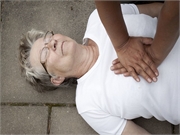Relatedly, survival from out-of-hospital cardiac arrest also lower
MONDAY, Jan. 6, 2020 (HealthDay News) — Individuals with out-of-hospital cardiac arrest in predominantly Hispanic neighborhoods are less likely to receive bystander cardiopulmonary resuscitation (B-CPR) and have a lower likelihood of survival, according to a study published in the Jan. 7 issue of Circulation.
Audrey L. Blewer, Ph.D., M.P.H., from the Duke University School of Medicine in Durham, North Carolina, and colleagues used data from the Resuscitation Outcomes Consortium Epistry (2011 to 2015) to assess whether the proportion of Hispanic residents in a neighborhood is associated with B-CPR delivery and survival for out-of-hospital cardiac arrest. Percentage of Hispanic residents was classified by census tract as <25 percent, 25 to 50 percent, 51 to 75 percent, or >75 percent.
Based on 18,927 U.S. arrest events, the researchers found that B-CPR was administered in 37 percent of events. In neighborhoods with <25 percent Hispanic residents, B-CPR was administered in 39 percent of events compared with 27 percent of events in neighborhoods with >75 percent Hispanic residents. Compared with neighborhoods with <25 percent Hispanic residents, the investigators observed lower B-CPR rates for out-of-hospital cardiac arrest in predominantly Hispanic neighborhoods (51 to 75 percent Hispanic: odds ratio, 0.79; >75 percent Hispanic: odds ratio, 0.72) as well as lower survival rates (>75 percent Hispanic: odds ratio, 0.56).
“These findings suggest a need to understand the underlying disparities in cardiopulmonary resuscitation delivery and an unmet cardiopulmonary resuscitation training need in Hispanic communities,” the authors write.
Copyright © 2020 HealthDay. All rights reserved.








